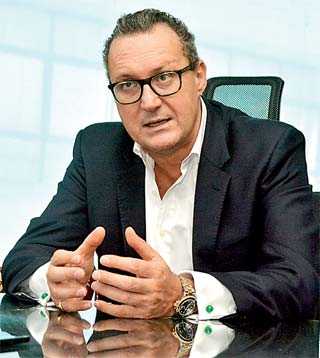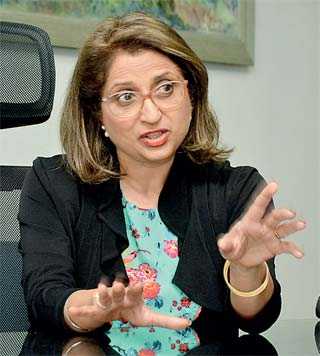Friday Feb 27, 2026
Friday Feb 27, 2026
Thursday, 31 January 2019 02:40 - - {{hitsCtrl.values.hits}}
By Darshana Abayasingha
The Global Chairman and Senior Partner for Healthcare, Government and Infrastructure of KPMG International, Dr. Mark Britnell, was in Sri Lanka last week, where he held discussions with the Minister of Health, and addressed the Sri Lanka Medical Council on the potential for public-private partnerships to provide universal healthcare.
 |
KPMG Global Healthcare Chairman Mark Britnell |
 |
KPMG Global Medical Director Dr. Niti Pall |
During his meeting, Dr. Britnell had asserted to the Minister that the proposed e-health card for all Sri Lankans “is a very big promise” that the Government is making, as only two or three other countries in the world had rolled out an e-health card including advanced nations such as France and Australia. Dr. Britnell, one of the foremost global experts on healthcare systems, told the Daily FT that Sri Lanka and the Health Ministry needs all the very best advice it can get on the rollout of the e-health card to ensure that the pilot project runs smoothly and problems identified early.
“Even Australia is just about to go through issuing their cards now. So, if Sri Lanka does it, that will be almost unique in the world. But to promise it and not deliver is a greater folly. It would be foolish, just because there is an election next year, to make a promise and have a pilot and say it’s a success and then to roll it across the country. No one will thank anyone for being foolish. I think the pilot is terribly exciting, and it needs the best support in the world, plus, it needs great deliberation amongst the experts in Sri Lanka. Let’s hope you get all of that,” Dr. Britnell added.
The Global Chairman and Senior Partner of KPMG International, Dr. Britnell, is a leading figure in healthcare having joined the NHS in the UK in 1989 and later established the Royal Centre for Defence Medicine. He joined the KPMG in 2009, and is a member of the Global Agenda Council on the future of the Health Sector for the World Economic Forum amongst many other distinguished appointments.
Dr. Britnell observed that there had been welcome developments in the health sector in Sri Lanka, but noted that the public system is clearly under tremendous pressure. Accordingly, in order to enhance and strengthen primary healthcare, the Government should embrace public-private partnerships to grow quickly, he said. These topics served as the foundation for his discussion with the Health Minister. Dr. Britnell remarked that the Government had received $ 200 million to strengthen primary healthcare in the country, and had asserted the need to find assurance and strong program management resources to ensure this complex rollout is managed to cost on time in a transparent manner to boost confidence and deliver results. He revealed that the Minister had been receptive to his suggestions, and added that there is great appetite for reform and at the same time a tremendous amount of frustration that things are moving too slowly.
“It is right to observe that public-private partnerships are in relative infancy in Asia, and I think it’s disrespectful to say that Asian countries cannot do public-private partnerships. I would say that for parts of Asia they are inheritably new. If you look at growth trends in terms of the growing economies, populations and health services; over the next two decades a lot of these partnerships will in fact take place in Asia. In the west we now have mature markets, they have stabilised and some would even say they have plateaued. Any public-private partnership needs an informed and intelligent government and client. Our job at KPMG is to build capacity and capability for the Government to be an intelligent funder, and for the private sector to become an intelligent partner. It takes time, but you need to build capability and capacity. If this present (Sri Lankan) Government expects to roll out primary care without the help of the private sector, it won’t happen. If it does happen, then it will happen too late. Therefore, some of the misperceptions, prejudices and animosity; they have to go – for the good of the people of Sri Lanka. The people need healthcare, and they will not forgive bureaucrats or private sector entrepreneurs if they don’t put aside their prejudice and work for the people,” Dr. Britnell stated.
KPMG’s Global Chairman was joined by Dr. Niti Pall, Medical Director to KPMG’s Global Health Practice, who explained that the NHS in the UK probably constituted the largest such public-private partnership in the world. General practice in the UK are privately-owned and are run by GPs with entrepreneurial skills, and the British government maintains contracts that pays for it, which not only constitutes service by the right outcomes. She pointed to similar examples from all over the world including Spain, Portugal, Indonesia and Vietnam, where KPMG had worked to build capacity to make it happen. India too has made significant shifts in their vision, she said, pointing to President Modi’s plan to provide a $ 6,000 cover for a family of four for over half a billion people, in addition to setting up 200,000 wellness centres across the country. A lot of the states are seriously looking at how to bring in private healthcare players to operate some of these primary healthcare facilities from even beyond the traditional sector, she said.
The KPMG team pointed to Bangladesh, where almost 70% of all patient contacts are dealt with over mobile phones, as it is cheaper, quicker and far more efficient for doctors, nurses and patients alike. “Now, why should Bangladesh be more advanced in primary care than here in Sri Lanka, when the software for that entire operation was in fact built here in Sri Lanka,” they averred. “Are we getting the best value for the money we spend here?” Bangladesh has moved into healthcare in their pockets using a solution built here in Sri Lanka, and the healthcare sector here too should move ahead into the future with a solution which is suited for Asia and the 21st century.
Dr. Britnell said: “The reason why it worked in Bangladesh is because they thought very hard about what a consumer would use. What would make it easy for them to use; what would make them come back to it? Even with the e-health card, if you want it to be a success, pay attention to that bit about the product and make sure people are coming back to using it. Everyone is used to digitalisation of their lives here, healthcare is the last frontier where digitisation hasn’t happened. In Bangladesh, the payment mechanism was also tagged to the product and micro insurance. Your people are still coming to the hospital and Colombo, because they think they won’t receive primary healthcare wherever they are. Sri Lanka maybe in danger of creating an analogue solution in the digital age. This is our fear. It is not too late; the country has received good money from the World Bank and it should be attracting the best talent you have to tackle it. Sri Lanka has the talent; that is how it got to Bangladesh.”
Dr. Britnell pointed out that many people around the world respect the Sri Lankan health system for its ability to provide universal healthcare for just about 3.2% of its GDP, which he said is a remarkable achievement despite the numerous challenges faced by the sector in its long history. However, it is time to get a move on now, in terms of the quality of the service provided and its efficiency. For years now, the Government has spoken of strengthening primary healthcare; but the time for talking is now finished, and the whole world is watching if these big promises will finally be delivered and if it would be done in a fair and transparent manner, he said. “There are no dress rehearsals and you cannot go back.”
Technology and digital solutions help empower patients who have long-term conditions. Alongside a fast ageing population, and the need to address long-term conditions with the significant rise in Non-Communicable Diseases (NCD), many more services or healthcare can be provided direct to people’s homes through tele-health and tele-medicine. These are commonplace issues to developed and developing nations, and technology must be at the centre to address these issues. NCDs are growing rapidly here in Sri Lanka, and their management lies not only with doctors and nurses, but also in the hands of patients who live with the condition. Employing technology, we could push the care into the hands of the patients. Sri Lanka is at the beginning of this journey, and possess all the requisites to guarantee positive outcomes. It boils down to a candid, committed and planned process which is what we are lacking on every front.
Pix by Upul Abayasekara